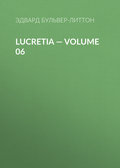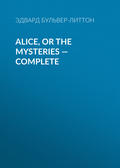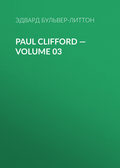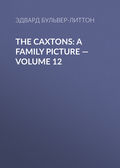
Эдвард Бульвер-Литтон
Kenelm Chillingly — Volume 01
"There are," he said, "two things in life that a sage must preserve at every sacrifice, the coats of his stomach and the enamel of his teeth. Some evils admit of consolations: there are no comforters for dyspepsia and toothache." A man of letters, but a man of the world, he had so cultivated his mind as both that he was feared as the one and liked as the other. As a man of letters he despised the world; as a man of the world he despised letters. As the representative of both he revered himself.
CHAPTER IX
ON the evening of the third day from the arrival of Mr. Mivers, he, the Parson, and Sir Peter were seated in the host's parlour, the Parson in an armchair by the ingle, smoking a short cutty-pipe; Mivers at length on the couch, slowly inhaling the perfumes of one of his own choice /trabucos/. Sir Peter never smoked. There were spirits and hot water and lemons on the table. The Parson was famed for skill in the composition of toddy. From time to time the Parson sipped his glass, and Sir Peter less frequently did the same. It is needless to say that Mr. Mivers eschewed toddy; but beside him, on a chair, was a tumbler and a large carafe of iced water.
SIR PETER.—"Cousin Mivers, you have now had time to study Kenelm, and to compare his character with that assigned to him in the Doctor's letter."
MIVERS (languidly).—"Ay."
SIR PETER.—"I ask you, as a man of the world, what you think I had best do with the boy. Shall I send him to such a tutor as the Doctor suggests? Cousin John is not of the same mind as the Doctor, and thinks that Kenelm's oddities are fine things in their way, and should not be prematurely ground out of him by contact with worldly tutors and London pavements."
"Ay," repeated Mr. Mivers more languidly than before. After a pause he added, "Parson John, let us hear you."
The Parson laid aside his cutty-pipe and emptied his fourth tumbler of toddy; then, throwing back his head in the dreamy fashion of the great Coleridge when he indulged in a monologue, he thus began, speaking somewhat through his nose,—
"At the morning of life—"
Here Mivers shrugged his shoulders, turned round on his couch, and closed his eyes with the sigh of a man resigning himself to a homily.
"At the morning of life, when the dews—"
"I knew the dews were coming," said Mivers. "Dry them, if you please; nothing so unwholesome. We anticipate what you mean to say, which is plainly this, When a fellow is sixteen he is very fresh: so he is; pass on; what then?"
"If you mean to interrupt me with your habitual cynicism," said the Parson, "why did you ask to hear me?"
"That was a mistake I grant; but who on earth could conceive that you were going to commence in that florid style? Morning of life indeed! bosh!"
"Cousin Mivers," said Sir Peter, "you are not reviewing John's style in 'The Londoner;' and I will beg you to remember that my son's morning of life is a serious thing to his father, and not to be nipped in its bud by a cousin. Proceed, John!"
Quoth the Parson, good-humouredly, "I will adapt my style to the taste of my critic. When a fellow is at the age of sixteen, and very fresh to life, the question is whether he should begin thus prematurely to exchange the ideas that belong to youth for the ideas that properly belong to middle age,—whether he should begin to acquire that knowledge of the world which middle-aged men have acquired and can teach. I think not. I would rather have him yet a while in the company of the poets; in the indulgence of glorious hopes and beautiful dreams, forming to himself some type of the Heroic, which he will keep before his eyes as a standard when he goes into the world as man. There are two schools of thought for the formation of character,—the Real and the Ideal. I would form the character in the Ideal school, in order to make it bolder and grander and lovelier when it takes its place in that every-day life which is called Real. And therefore I am not for placing the descendant of Sir Kenelm Digby, in the interval between school and college, with a man of the world, probably as cynical as Cousin Mivers and living in the stony thoroughfares of London."
MR. MIVERS (rousing himself).—"Before we plunge into that Serbonian bog—the controversy between the Realistic and the Idealistic academicians—I think the first thing to decide is what you want Kenelm to be hereafter. When I order a pair of shoes, I decide beforehand what kind of shoes they are to be,—court pumps or strong walking shoes; and I don't ask the shoemaker to give me a preliminary lecture upon the different purposes of locomotion to which leather can be applied. If, Sir Peter, you want Kenelm to scribble lackadaisical poems, listen to Parson John; if you want to fill his head with pastoral rubbish about innocent love, which may end in marrying the miller's daughter, listen to Parson John; if you want him to enter life a soft-headed greenhorn, who will sign any bill carrying 50 per cent to which a young scamp asks him to be security, listen to Parson John; in fine, if you wish a clever lad to become either a pigeon or a ring-dove, a credulous booby or a sentimental milksop, Parson John is the best adviser you can have."
"But I don't want my son to ripen into either of those imbecile developments of species."
"Then don't listen to Parson John; and there's an end of the discussion."
"No, there is not. I have not heard your advice what to do if John's advice is not to be taken."
Mr. Mivers hesitated. He seemed puzzled.
"The fact is," said the Parson, "that Mivers got up 'The Londoner' upon a principle that regulates his own mind,—find fault with the way everything is done, but never commit yourself by saying how anything can be done better."
"That is true," said Mivers, candidly. "The destructive order of mind is seldom allied to the constructive. I and 'The Londoner' are destructive by nature and by policy. We can reduce a building into rubbish, but we don't profess to turn rubbish into a building. We are critics, and, as you say, not such fools as to commit ourselves to the proposition of amendments that can be criticised by others. Nevertheless, for your sake, Cousin Peter, and on the condition that if I give my advice you will never say that I gave it, and if you take it that you will never reproach me if it turns out, as most advice does, very ill,—I will depart from my custom and hazard my opinion."
"I accept the conditions."
"Well then, with every new generation there springs up a new order of ideas. The earlier the age at which a man seizes the ideas that will influence his own generation, the more he has a start in the race with his contemporaries. If Kenelm comprehends at sixteen those intellectual signs of the time which, when he goes up to college, he will find young men of eighteen or twenty only just /prepared/ to comprehend, he will produce a deep impression of his powers for reasoning and their adaptation to actual life, which will be of great service to him later. Now the ideas that influence the mass of the rising generation never have their well-head in the generation itself. They have their source in the generation before them, generally in a small minority, neglected or contemned by the great majority which adopt them later. Therefore a lad at the age of sixteen, if he wants to get at such ideas, must come into close contact with some superior mind in which they were conceived twenty or thirty years before. I am consequently for placing Kenelm with a person from whom the new ideas can be learned. I am also for his being placed in the metropolis during the process of this initiation. With such introductions as are at our command, he may come in contact not only with new ideas, but with eminent men in all vocations. It is a great thing to mix betimes with clever people. One picks their brains unconsciously. There is another advantage, and not a small one, in this early entrance into good society. A youth learns manners, self-possession, readiness of resource; and he is much less likely to get into scrapes and contract tastes for low vices and mean dissipation, when he comes into life wholly his own master, after having acquired a predilection for refined companionship under the guidance of those competent to select it. There, I have talked myself out of breath. And you had better decide at once in favour of my advice; for as I am of a contradictory temperament, myself of to-morrow may probably contradict myself of to-day."
Sir Peter was greatly impressed with his cousin's argumentative eloquence.
The Parson smoked his cutty-pipe in silence until appealed to by Sir Peter, and he then said, "In this programme of education for a Christian gentleman, the part of Christian seems to me left out."
"The tendency of the age," observed Mr. Mivers, calmly, "is towards that omission. Secular education is the necessary reaction from the special theological training which arose in the dislike of one set of Christians to the teaching of another set; and as these antagonists will not agree how religion is to be taught, either there must be no teaching at all, or religion must be eliminated from the tuition."
"That may do very well for some huge system of national education," said Sir Peter, "but it does not apply to Kenelm, as one of a family all of whose members belong to the Established Church. He may be taught the creed of his forefathers without offending a Dissenter."
"Which Established Church is he to belong to?" asked Mr.
Mivers,—"High Church, Low Church, Broad Church, Puseyite Church, Ritualistic Church, or any other Established Church that may be coming into fashion?"
"Pshaw!" said the Parson. "That sneer is out of place. You know very well that one merit of our Church is the spirit of toleration, which does not magnify every variety of opinion into a heresy or a schism. But if Sir Peter sends his son at the age of sixteen to a tutor who eliminates the religion of Christianity from his teaching, he deserves to be thrashed within an inch of his life; and," continued the Parson, eying Sir Peter sternly, and mechanically turning up his cuffs, "I should /like/ to thrash him."
"Gently, John," said Sir Peter, recoiling; "gently, my dear kinsman. My heir shall not be educated as a heathen, and Mivers is only bantering us. Come, Mivers, do you happen to know among your London friends some man who, though a scholar and a man of the world, is still a Christian?"
"A Christian as by law established?"
"Well—yes."
"And who will receive Kenelm as a pupil?"
"Of course I am not putting, such questions to you out of idle curiosity."
"I know exactly the man. He was originally intended for orders, and is a very learned theologian. He relinquished the thought of the clerical profession on succeeding to a small landed estate by the sudden death of an elder brother. He then came to London and bought experience: that is, he was naturally generous; he became easily taken in; got into difficulties; the estate was transferred to trustees for the benefit of creditors, and on the payment of L400 a year to himself. By this time he was married and had two children. He found the necessity of employing his pen in order to add to his income, and is one of the ablest contributors to the periodical press. He is an elegant scholar, an effective writer, much courted by public men, a thorough gentleman, has a pleasant house, and receives the best society. Having been once taken in, he defies any one to take him in again. His experience was not bought too dearly. No more acute and accomplished man of the world. The three hundred a year or so that you would pay for Kenelm would suit him very well. His name is Welby, and he lives in Chester Square."
"No doubt he is a contributor to 'The Londoner,'" said the Parson, sarcastically.
"True. He writes our classical, theological, and metaphysical articles. Suppose I invite him to come here for a day or two, and you can see him and judge for yourself, Sir Peter?"
"Do."
CHAPTER X
MR. WELBY arrived, and pleased everybody. A man of the happiest manners, easy and courteous. There was no pedantry in him, yet you could soon see that his reading covered an extensive surface, and here and there had dived deeply. He enchanted the Parson by his comments on Saint Chrysostom; he dazzled Sir Peter with his lore in the antiquities of ancient Britain; he captivated Kenelm by his readiness to enter into that most disputatious of sciences called metaphysics; while for Lady Chillingly, and the three sisters who were invited to meet him, he was more entertaining, but not less instructive. Equally at home in novels and in good books, he gave to the spinsters a list of innocent works in either; while for Lady Chillingly he sparkled with anecdotes of fashionable life, the newest /bons mots/, the latest scandals. In fact, Mr. Welby was one of those brilliant persons who adorn any society amidst which they are thrown. If at heart he was a disappointed man, the disappointment was concealed by an even serenity of spirits; he had entertained high and justifiable hopes of a brilliant career and a lasting reputation as a theologian and a preacher; the succession to his estate at the age of twenty-three had changed the nature of his ambition. The charm of his manner was such that he sprang at once into the fashion, and became beguiled by his own genial temperament into that lesser but pleasanter kind of ambition which contents itself with social successes and enjoys the present hour. When his circumstances compelled him to eke out his income by literary profits, he slid into the grooves of periodical composition, and resigned all thoughts of the labour required for any complete work, which might take much time and be attended with scanty profits. He still remained very popular in society, and perhaps his general reputation for ability made him fearful to hazard it by any great undertaking. He was not, like Mivers, a despiser of all men and all things; but he regarded men and things as an indifferent though good-natured spectator regards the thronging streets from a drawing-room window. He could not be called /blase/, but he was thoroughly /desillusionne/. Once over-romantic, his character now was so entirely imbued with the neutral tints of life that romance offended his taste as an obtrusion of violent colour into a sober woof. He was become a thorough Realist in his code of criticism, and in his worldly mode of action and thought. But Parson John did not perceive this, for Welby listened to that gentleman's eulogies on the Ideal school without troubling himself to contradict them. He had grown too indolent to be combative in conversation, and only as a critic betrayed such pugnacity as remained to him by the polished cruelty of sarcasm.
He came off with flying colours through an examination into his Church orthodoxy instituted by the Parson and Sir Peter. Amid a cloud of ecclesiastical erudition, his own opinions vanished in those of the Fathers. In truth, he was a Realist, in religion as in everything else. He regarded Christianity as a type of existent civilization, which ought to be reverenced, as one might recognize the other types of that civilization; such as the liberty of the press, the representative system, white neckcloths and black coats of an evening, etc. He belonged, therefore, to what he himself called the school of Eclectical Christiology; and accommodated the reasonings of Deism to the doctrines of the Church, if not as a creed, at least as an institution. Finally, he united all the Chillingly votes in his favour; and when he departed from the Hall carried off Kenelm for his initiation into the new ideas that were to govern his generation.







